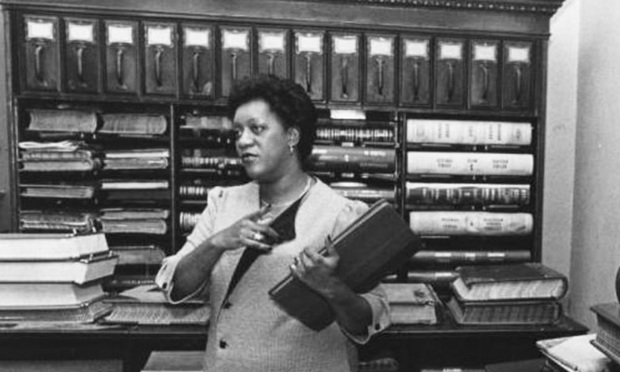'True Advocate of Equality': Nation's First African American Probate Judge Dies at 78
Edith Jacqueline Ingram Grant, who served as Hancock County's probate judge for 36 years, was also Georgia's first black female judge.
June 09, 2020 at 02:39 PM
4 minute read
 Former Hancock County Probate Judge Edith Jacqueline Ingram Grant in 1969. Grant became the first black probate judge in U. S. history and the first black female judge in the history of Georgia.
Former Hancock County Probate Judge Edith Jacqueline Ingram Grant in 1969. Grant became the first black probate judge in U. S. history and the first black female judge in the history of Georgia.
Heralded as a trailblazer, the nation's first African American probate judge died quietly in her hometown of Sparta, Georgia, Friday, more than 51 years after her historic election, according to the state Council of Probate Judges.
Edith Jacqueline Ingram Grant, who served as Hancock County's probate judge for 36 years, was also the state's first black female judge, according to council Executive Director Kevin Holder. She was 78.
Georgia Supreme Court Justice Harold Melton saluted Grant as "a true pioneer."
"When I think of the strength of character and determination that it took, and the loneliness that she must have had to endure to become the first black female judge in Georgia history, I am truly awestruck and humbled," Melton said. "Through the exceptional example set by Judge Grant, and set by those women and men who have continued to follow in her footsteps, a path for future progress has been opened for all of us that may otherwise have never existed. As we walk that path, we must always remember the strength and perseverance of, and give honor to, the woman who made it possible."
Cobb County Chief Probate Judge Kelli Wolk, president of the state Council of Probate Court Judges, called Grant "an inspiration."
"She valued integrity, and she was an exemplar of humility during her nearly four decades of service to Hancock County," Wolk said. "The history of our country, this state and our class of court are much better because of her contributions."
Hancock County Probate Judge Sabrina Lamar said that Grant "loved Hancock County, and she worked tirelessly for the betterment of our community. She was a fighter and a true advocate of equality and equal justice for all."
Grant was born Jan. 16, 1942, in Sparta. After graduating from high school, she enrolled in New York City College for Nurses before returning to Georgia to attend Fort Valley State College, now known as Fort Valley State University, according to an alumni profile of her. Grant majored in education and graduated in 1963.
Grant then embarked on a teaching career, first in Griffin and then at a Sparta high school founded by her father and maternal grandfather, according to HistoryMakers, the nation's largest African American video oral history archive.
In a 2006 interview with HistoryMakers, Grant said that, when her father ran for public office in Hancock County in 1966, members of the black community were first told they could serve as poll workers. But on Election Day, the judge of what was then known as the Court of the Ordinary barred them from doing so in language laced with racial epithets. At the time, Grant said, community members promised the judge, a white woman, "that her politicking days were over."
Two years later, the Hancock County Democratic Club, which was not affiliated with the state Democratic Party, recruited Grant to challenge the judge, she said. Grant said her father, Robert T. Ingram, who at the time was the only African American on the Hancock County school board, encouraged her to run.
"My daddy and others kept explaining to me the importance of it," she recalled. "And their main reason was because as ordinary, one of her duties is to supervise the elections."
Grant won the 1968 election, seven months after Martin Luther King Jr. was assassinated. But when she went to the courthouse to ask her predecessor to brief her on court operations, the judge cursed her and ordered her to get out of the office, Grant recalled. The defeated judge then closed down the court, locked the doors and turned the keys over to the Superior Court clerk, a white man, Grant said. "I just had to wait until I got in there and hit the books," Grant recalled.
Grant served as judge for the next 36 years. In 1973, the ordinary court was renamed the probate court. She also served as president of the Georgia Coalition of Black Women. She retired in 2004.
This content has been archived. It is available through our partners, LexisNexis® and Bloomberg Law.
To view this content, please continue to their sites.
Not a Lexis Subscriber?
Subscribe Now
Not a Bloomberg Law Subscriber?
Subscribe Now
NOT FOR REPRINT
© 2025 ALM Global, LLC, All Rights Reserved. Request academic re-use from www.copyright.com. All other uses, submit a request to [email protected]. For more information visit Asset & Logo Licensing.
You Might Like
View All

Evidence Explained: Prevailing Attorney Outlines Successful Defense in Inmate Death Case


Trending Stories
- 1New York-Based Skadden Team Joins White & Case Group in Mexico City for Citigroup Demerger
- 2No Two Wildfires Alike: Lawyers Take Different Legal Strategies in California
- 3Poop-Themed Dog Toy OK as Parody, but Still Tarnished Jack Daniel’s Brand, Court Says
- 4Meet the New President of NY's Association of Trial Court Jurists
- 5Lawyers' Phones Are Ringing: What Should Employers Do If ICE Raids Their Business?
Who Got The Work
J. Brugh Lower of Gibbons has entered an appearance for industrial equipment supplier Devco Corporation in a pending trademark infringement lawsuit. The suit, accusing the defendant of selling knock-off Graco products, was filed Dec. 18 in New Jersey District Court by Rivkin Radler on behalf of Graco Inc. and Graco Minnesota. The case, assigned to U.S. District Judge Zahid N. Quraishi, is 3:24-cv-11294, Graco Inc. et al v. Devco Corporation.
Who Got The Work
Rebecca Maller-Stein and Kent A. Yalowitz of Arnold & Porter Kaye Scholer have entered their appearances for Hanaco Venture Capital and its executives, Lior Prosor and David Frankel, in a pending securities lawsuit. The action, filed on Dec. 24 in New York Southern District Court by Zell, Aron & Co. on behalf of Goldeneye Advisors, accuses the defendants of negligently and fraudulently managing the plaintiff's $1 million investment. The case, assigned to U.S. District Judge Vernon S. Broderick, is 1:24-cv-09918, Goldeneye Advisors, LLC v. Hanaco Venture Capital, Ltd. et al.
Who Got The Work
Attorneys from A&O Shearman has stepped in as defense counsel for Toronto-Dominion Bank and other defendants in a pending securities class action. The suit, filed Dec. 11 in New York Southern District Court by Bleichmar Fonti & Auld, accuses the defendants of concealing the bank's 'pervasive' deficiencies in regards to its compliance with the Bank Secrecy Act and the quality of its anti-money laundering controls. The case, assigned to U.S. District Judge Arun Subramanian, is 1:24-cv-09445, Gonzalez v. The Toronto-Dominion Bank et al.
Who Got The Work
Crown Castle International, a Pennsylvania company providing shared communications infrastructure, has turned to Luke D. Wolf of Gordon Rees Scully Mansukhani to fend off a pending breach-of-contract lawsuit. The court action, filed Nov. 25 in Michigan Eastern District Court by Hooper Hathaway PC on behalf of The Town Residences LLC, accuses Crown Castle of failing to transfer approximately $30,000 in utility payments from T-Mobile in breach of a roof-top lease and assignment agreement. The case, assigned to U.S. District Judge Susan K. Declercq, is 2:24-cv-13131, The Town Residences LLC v. T-Mobile US, Inc. et al.
Who Got The Work
Wilfred P. Coronato and Daniel M. Schwartz of McCarter & English have stepped in as defense counsel to Electrolux Home Products Inc. in a pending product liability lawsuit. The court action, filed Nov. 26 in New York Eastern District Court by Poulos Lopiccolo PC and Nagel Rice LLP on behalf of David Stern, alleges that the defendant's refrigerators’ drawers and shelving repeatedly break and fall apart within months after purchase. The case, assigned to U.S. District Judge Joan M. Azrack, is 2:24-cv-08204, Stern v. Electrolux Home Products, Inc.
Featured Firms
Law Offices of Gary Martin Hays & Associates, P.C.
(470) 294-1674
Law Offices of Mark E. Salomone
(857) 444-6468
Smith & Hassler
(713) 739-1250






